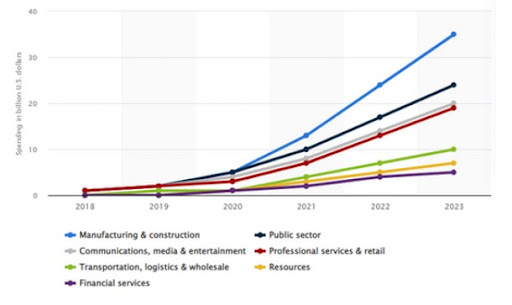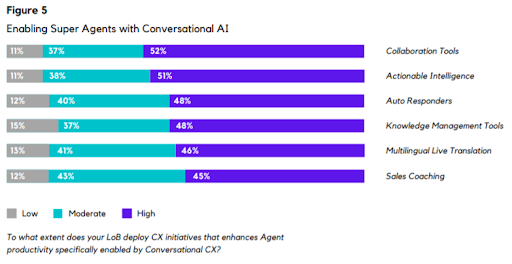Table of Contents
01 The Insurance Monthly Roundup
02 State of Extended Reality in an Experience Economy, 2022
03 Mantra Labs has been awarded the ISO 27001:2013 certification!
04 Rise of CX-aided Super Agents
05 Implementing a Clean Architecture with Nest.JS
CEOs Speak
“Building an intelligent and frictionless experience for the Gen Z customers may require quite a bit of technology heavy lifting. Correct choices will set up the organization for long term success.”
-Parag Sharma
CEO & Founder
Mantra Labs
The Insurance Monthly Roundup
(India)
- IRDAI has made KYC mandatory for Health & General Insurance policies from 1st Nov and will not extend the deadline further.
- One-stop shop ‘Bima Sugam’ will assist insurers and IRDAI in tracking integrated data to better understand coverage patterns, customer needs, and product specifications and boost insurance penetration. The solution will also help save insurance policies in a Demat format, making it simpler to handle renewals and claims.
- Together with Riskcovry, Housing.com is planning to launch a first-of-its-kind solution, ‘Rent Protect Cover’. This alliance will help tenants to get protection in the event of accidental death, hospitalization, and critical illnesses.
(Global)
- International Solar Alliance (ISA) has approved the ‘Solar Facility’, a payment guarantee mechanism to attract private capital to flow in Africa while ensuring a purchase payment and insurance mechanism as a first loss guarantee.
- Pie Insurance has received $315 million Series D round of funding in 2022, making it the first P&C insurtech in the U.S. The funds will be used to expand operations, create cutting-edge, proprietary pricing algorithms, and provide small companies and their partner agents with a world-class user and product experience.
- Otonomi, a Brooklyn-based insurtech company, has secured $3.4 million to create a first-to-market parametric cargo delay insurance solution driven by blockchain. This technology enables claims settlement in 45 minutes and reduces administrative expenses by up to 90%.
Open Finance: Reality or Hype?
Read the full blog, here.
State of Extended Reality in an Experience Economy, 2022
Today’s customers are digitally savvy, demanding, and value-driven. They have witnessed a pandemic for more than 2 years now, and are clamoring for an enriched experience that goes beyond the 2D outlay a laptop or mobile can provide. With this demand for improved CX and the rapidly evolving digital infrastructure, extended reality (XR) has gained tremendous interest from technology and business leaders in equal measures.
According to a study conducted by Poplar, globally, 75% of consumers expect their retailers to now offer an AR experience. Further, the rise of Metaverse has been augmented by the rise in Web 3.0 applications like NFTs and Cryptocurrency.
Source: Statista 2021, Market Spending on XR Technologies Worldwide from 2018-2023
While the maturity rates are not the same in all industries, some show greater inclination than others in their quick adoption. Providing personalized assistance can go a long way in building long-lasting relationships with customers. Whether with guided product tutorials through a VR environment, previewing products through an AR app before purchase, or remote assistance through mixed reality. Such digital touchpoints can help improve customer satisfaction.
As per IBM’s report, the Financial Services industry is expected to have the highest spending in XR for improved customer engagement. The market is estimated to grow at a CAGR of 133.9% in the next decade, with a keen interest in higher brand recall through XR.
Industry leaders need to tap into the benefits and differentiation that having an AR experience can provide. A reluctance to do this would invite the risk of missing the bus to disrupt new entrants more attuned to consumer needs. With customer loyalty waning away faster than ever before, companies can no longer afford to be reactive in their offerings.
The State of Extended Reality in an Experience Economy
Read the full report, here.
Mantra Labs has been awarded the ISO 27001:2013 certification!

Mantra Labs is proud to announce that our Information Security Management System (ISMS) is certified to meet the requirements of the ISO 27001:2013 standard.
“Our company-wide approach to data protection ensures the highest standard of security for our customers. This certification is additional proof of our commitment to information security”, said Mikhail Mitra, Co-founder, Mantra Labs. Mantra Labs Certification reflects the importance we place on protecting our clients’ data. Our ISMS defines a set of policies and processes that ensure confidentiality, integrity, and availability for all of the data that we handle.
We remain committed to meeting the highest security and privacy standards while serving as a trusted, secure partner for your data.
How to Win Customers through Smarter Form Filling?
Read our Latest Blog here.
Rise of CX-aided Super Agents
AI-aided Super Agents can ‘engage to win’ customers with 63% more success.
Though AI saw adoption rates jump 50% in 2020, usage rates remain low. This gap presents an opportunity for businesses to make AI a better partner to agents.
Only 47% of agents believe they have tools to succeed in a post-pandemic world. AI remains an underutilized tool, despite the adoption boost, among larger carriers.
High-performing teams across other industries are 93% more likely to have agents working across multiple channels, and have three times more agents doing so. Agents empowered by AI can increase productivity and boost sales performance with contextual insights — like the customer’s email, order history, or why they last reached out.
Source: Mantra Labs Whitepaper
Elevating Conversational CX In Insurance
Read the full report.
Implementing a Clean Architecture with Nest.JS
Nest or NestJS is a framework for building efficient, scalable Node.js applications (server-side) built with TypeScript. It uses Express or Fastify and allows a level of abstraction to enable developers to use an ample amount of modules (third-party) within their code.
Here are the 3 building blocks of NestJS and what each of them does.
- Modules: NestJS is structured in such a way that we can treat each feature as a module. For eg., anything which is linked with the User such as models, controllers, DTOs, interfaces, etc., can be separated as a module. A module has a controller and a bunch of providers which are injectible functionalities like services, orm, emailer, etc.
- Controllers: Controllers in NestJS are interfaces between the network and your logic. They are used for handling requests and returning responses to the client side of the application (for example, call to the API).
- Providers (Services): Providers are injectable services/functionalities which can be injected into controllers and other providers to provide flexibility and extra functionality. They are designed to abstract any form of complexity and logic.
Read the full blog, here.
Business cognizance for the new-age digital insurers





